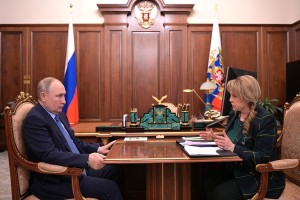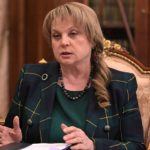

Moscow/Washington/New York: Amidst international concern over the health of imprisoned Russian political activist Aleksey Navalny, the Chairperson of the Central Election Commission of Russia, Ella Pamfilova, without naming the opposition leader, today told President Vladimir Putin that “it is very unfair that our opponents…and those helping them often try, using ‘pseudo’ truth”, to discredit the work of the election commission. “There are almost a million of them; they mostly carry out a social mission,” she told Putin in a meeting to brief him on the ensuing September elections to the State Duma and in the regions in Russia.
Already there were hypotheses doing the rounds around the now partially subsided resurgence of Russian military aggression near the Eastern borders of Ukraine that many Russians viewed as a diversionary tactic to whip up patriotic fervour prior to the forthcoming September elections in Russia, particularly when massive numbers are reportedly favouring Putin’s jailed Political opponent Alexei Navalny who had staged a nationwide anti corruption drive against the ruling dispensation.
“I would say, popular but false stereotype that has been hammered into the heads of the people that the electoral commissions are only and totally about officials,” she said.

Pamfilova further told Putin today: “I have not spoken about it yet, but now I want to admit that in fact, there were more than enough of our opponents who wanted to, if not disrupt the voting, at least discredit it. That is, we worked in quite a difficult environment: all over the country, they tried to put pressure on election commission members so that they would leave the commissions, not show up at the voting and stop working, thus trying to destabilise the work of the commissions. But again, the system is stable, and it survived all that. Our colleagues in the regions came to literally everyone – in the taiga, tundra, at sea, on horses, helicopters and boats – to give everyone the opportunity to vote.
Navalny had, of late, been removed to a hospital for medical treatment after the hunger strike he had been on. The US has already taken a stand over his arrest and as recently as on April 19, 2021, White House Press Secretary Jen Psaki had warned that “If Mr. Navalny dies, well, there will be consequences to the Russian government, and we reserve those options”.
During a press conference, Psaki had reiterated that what happens to Navalny in the custody of the Russian government was the responsibility of the Russian government, “and that they will be held accountable by the international community”.
Psaky had claimed that in President Joe Biden’s first conversation with President Putin, he had raised a range of concerns, including the treatment of Navalny – a claim that Moscow had denied. However, the US reiterated that in course of Biden’s first call with Putin, the POTUS had indeed conveyed a range of concerns, including the treatment of Aleksey Navalny. “We issued, in coordination with our European partners, a number of steps to — a number of sanctions in response to the poisoning of Aleksey Navalny,” Psaky had asserted, adding that there were a range of private conversations that occur diplomatically, “and we continue to reiterate publicly as well our call for him to be released, to be treated humanely”.
It may be mentioned that Navalny, one of the fiercest critic of Putin, had emerged as Russia’s most prominent opposition. On February 2, 2021, a Moscow court had held him guilty of violating his parole and sentenced him to more than two years in prison, which immediately became an international event. Soon thereafter, on February 4, the Office of the United Nations High Commissioner for Human Rights (OHCHR), called for the immediate release of Navalny and his 1400 supporters who were detained for “exercising their rights to freedom of peaceful assembly and expression over the past few weeks of protests across the country”.
However, ignoring the international hue and cry over Navalny’s arrest, Russia suspended all of his offices across the country while a court considered whether they were extremist operations. At the United Nations headquarters in New York, Farhan Haq , Deputy Spokesman for the UN Secretary-General, told media persons on April 26, that the office of the Secretary-General did make clear its concerns about Navalny’s case, including, concerns about his reported health conditions and his need for medical treatment. “We will continue to monitor to make sure that their treatment is, indeed, fair and is proceeding in accordance with respect, among other things, for human rights defenders,” Haq had said.
– global bihari bureau





